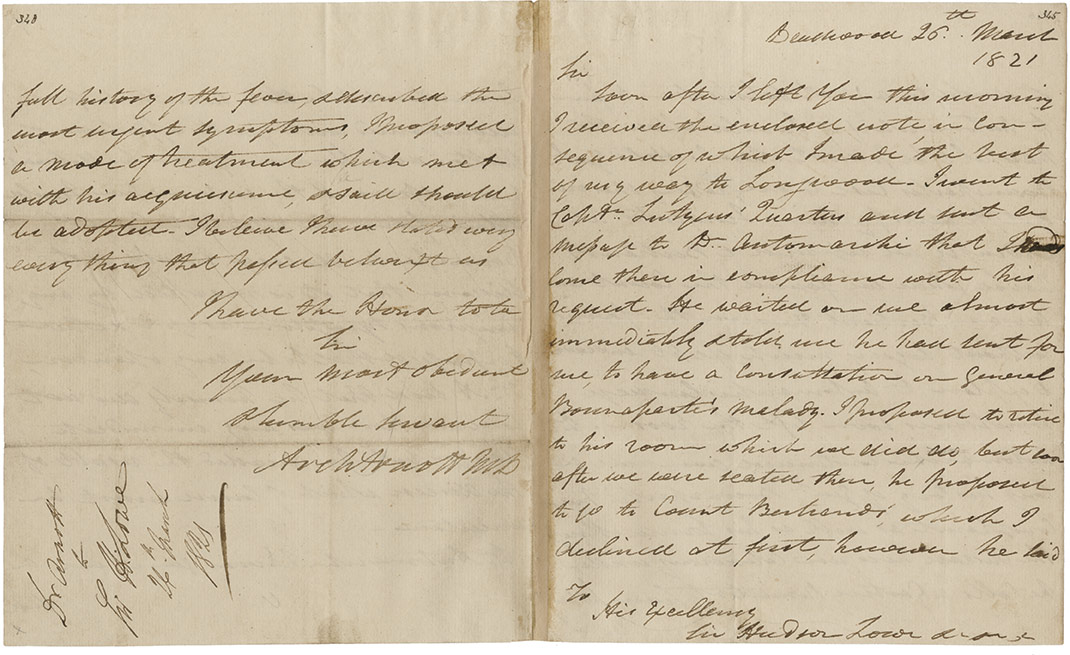
4 500 €
RéserverARNOTT Archibald [Ecclefechan, Dumfries, Écosse, 1772 - id., 1855], médecin militaire britannique, il soigna Napoléon à Sainte-Hélène.
Lettre autographe signée
Lettre autographe signée, adressée à Hudson Lowe. 26 mars 1821 ; 4 pages in-4°, en anglais.
« Soon after I left you this morning, I received the enclosed note in consequence of which made the rest of my way to Longwood. I went to the Capt Lutyens Quarters and sent a message to Dr Antomarchi that I come there in compliance with his request. He waited on me almost immediately & told me he had sent for me, to have a consultation on General Bonaparte'malady. [
] then he proposed to go to count Bertrand which I declined at first, however he said it would be a great satisfaction to him (Dr Antomarchi) if I would allow the marshal to be present when he started Gnl Bounaparte case to me taking this view of it, to satisfy him honnested [
]. Dr Antomarchi continued giving me a long history of Genl Bounaparte's present complaint as well now laboring writer he call a gastric remittent from which I understand to be a remittent from accompanied with great affection of the stomach.
However from his statement to me after all the information I could obtain from his regarding General Bounaparte'disease I could not discover that it is marked by any dangerous symptoms as yet when I expected that to be my opinion.
Dr A. said, that he himself did not concerned then was any immediate danger, but he dreaded the result of the disease, which of course must be incertain.
Dr Antomarchi having guess me a full history of the fever assessment the most urgent symptoms, I proposed a mode of treatment which met with his acquiescement & said should be adopted. [
]»
« Peu de temps après que je vous ai quitté ce matin, j'ai reçu la note ci-jointe en conséquence de laquelle j'ai fait le reste de mon chemin
vers Longwood. Je suis allé au quartier du Capt Lutyens et j'ai envoyé un message au Dr Antommarchi pour lui dire que je venais là-bas conformément à sa demande. Il m'a attendu presque aussitôt et m'a dit qu'il m'avait fait appeler pour avoir une consultation sur la maladie du général Bonaparte. [
] puis il a proposé d'aller chez le comte Bertrand que j'ai refusé au début, mais il a dit que ce serait une grande satisfaction pour lui (Dr Antommarchi) si je le voulais permettre au maréchal d'être présent lorsqu'il a commencé [à parler de] la cause du Gnl Bounaparte pour que j'en prenne ce point de vue, pour satisfaire son intégrité. [
]. Le Dr Antommarchi a continué à me raconter une longue histoire. Le Genl Bounaparte se plaint actuellement pendant son travail d'écrivain, de ce qu'il nomme un problème gastrique intermittent dont je comprends qu'il s'agit d'une fièvre rémittente accompagnée d'une grande infection de l'estomac. Cependant, d'après sa déclaration, après toutes les informations que j'ai pu obtenir de lui concernant la maladie du général Bounaparte, je n'ai pas pu découvrir qu'elle était encore marquée par des symptômes dangereux alors que je m'attendais à ce que ce soit mon opinion.
Dr A. a dit que lui-même ne se souciait pas du danger immédiat, mais il redoutait l'évolution de la maladie, qui, bien entendu, serait incertaine.
Le Dr Antomarchi m'ayant raconté un historique complet de l'évaluation de la fièvre des symptômes les plus urgents, j'ai proposé un mode de traitement qui a rencontré son acquiescement et a dit qu'il fallait l'adopter ».



